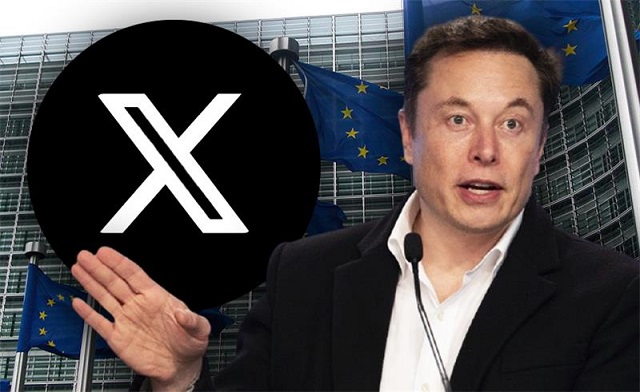Censorship Industrial Complex
Elon Musk said the EU offered X an ‘illegal deal’ if it would quietly censor speech

From LifeSiteNews
‘The European Commission offered 𝕏 an illegal secret deal: if we quietly censored speech without telling anyone, they would not fine us,’ Elon Musk wrote on July 12.
Elon Musk has said that the European Union (E.U.) offered his social media platform X an “illegal deal” to quietly censor speech so the company would not get fined.
“The European Commission offered 𝕏 an illegal secret deal: if we quietly censored speech without telling anyone, they would not fine us,” Musk wrote on X on July 12.
“The other platforms accepted that deal. 𝕏 did not,” he added.
The tech billionaire posted these comments in response to a post by Margrethe Vestager, the Vice-President of E.U.’s Digital Commission. She wrote that X “doesn’t comply with the DSA [Digital Service Act] in key transparency areas.”
Musk announced he will take the E.U. “to a very public battle in court, so that the people of Europe can know the truth.”
Thierry Breton, the E.U.’s Commissioner for Internal Market, responded to the tech billionaire, denying the existence of a “secret deal” offered to X and other social media platforms.
“There has never been — and will never be — any ‘secret deal.’ With anyone,” Breton insisted.
“The DSA provides X (and any large platform) with the possibility to offer commitments to settle a case.”
“To be extra clear: it’s *YOUR* team who asked the Commission to explain the process for settlement and to clarify our concerns.”
“We did it in line with established regulatory procedures,” he continued. “Up to you to decide whether to offer commitments or not. That is how rule of law procedures work.”
The E.U. introduced the Digital Service Act (DSA) in August 2023. It grants the E.U. Commission the power to impose heavy fines on large social media platforms operating in the E.U. if they do not comply with its rules on so-called “disinformation” and “hate speech.” Back in August last year, Breton even threatened to shut down social media platforms if they do not comply with the rules in the case of civil unrest, like the riots in France at the time.
As former Trump State Department official Michael Benz pointed out, the E.U. collaborated closely with the left-wing, globalist news rating organization NewsGuard, whose personnel is entangled with the U.S. intelligence agencies and other parts of the U.S. government.
In 2021, the Department of Defense awarded NewsGuard $750,000 for its project “Misinformation Fingerprints,” which aims to combat what it calls “a catalogue of known hoaxes, falsehoods and misinformation narratives that are spreading online.”
Censorship Industrial Complex
UK Government “Resist” Program Monitors Citizens’ Online Posts

Alberta
Alberta bill would protect freedom of expression for doctors, nurses, other professionals

From LifeSiteNews
‘Peterson’s law,’ named for Canadian psychologist Jordan Peterson, was introduced by Alberta Premier Danielle Smith.
Alberta’s Conservative government introduced a new law that will set “clear expectations” for professional regulatory bodies to respect freedom of speech on social media and online for doctors, nurses, engineers, and other professionals.
The new law, named “Peterson’s law” after Canadian psychologist Jordan Peterson, who was canceled by his regulatory body, was introduced Thursday by Alberta Premier Danielle Smith.
“Professionals should never fear losing their license or career because of a social media post, an interview, or a personal opinion expressed on their own time,” Smith said in a press release sent to media and LifeSiteNews.
“Alberta’s government is restoring fairness and neutrality so regulators focus on competence and ethics, not policing beliefs. Every Albertan has the right to speak freely without ideological enforcement or intimidation, and this legislation makes that protection real.”
The law, known as Bill 13, the Regulated Professions Neutrality Act, will “set clear expectations for professional regulatory bodies to ensure professionals’ right to free expression is protected.”
According to the government, the new law will “Limit professional regulatory bodies from disciplining professionals for expressive off-duty conduct, except in specific circumstances such as threats of physical violence or a criminal conviction.”
It will also restrict mandatory training “unrelated to competence or ethics, such as diversity, equity, and inclusion training.”
Bill 13, once it becomes law, which is all but guaranteed as Smith’s United Conservative Party (UCP) holds a majority, will also “create principles of neutrality that prohibit professional regulatory bodies from assigning value, blame or different treatment to individuals based on personally held views or political beliefs.”
As reported by LifeSiteNews, Peterson has been embattled with the College of Psychologists of Ontario (CPO) after it mandated he undergo social media “training” to keep his license following posts he made on X, formerly Twitter, criticizing Trudeau and LGBT activists.
He recently noted how the CPO offered him a deal to “be bought,” in which the legal fees owed to them after losing his court challenge could be waived but only if he agreed to quit his job as a psychologist.
Early this year, LifeSiteNews reported that the CPO had selected Peterson’s “re-education coach” for having publicly opposed the LGBT agenda.
The Alberta government directly referenced Peterson’s (who is from Alberta originally) plight with the CPO, noting “the disciplinary proceedings against Dr. Jordan Peterson by the College of Psychologists of Ontario, demonstrate how regulatory bodies can extend their reach into personal expression rather than professional competence.”
“Similar cases involving nurses, engineers and other professionals revealed a growing pattern: individuals facing investigations, penalties or compulsory ideological training for off-duty expressive conduct. These incidents became a catalyst, confirming the need for clear legislative boundaries that protect free expression while preserving professional standards.”
Alberta Minister of Justice and Attorney General Mickey Amery said regarding Bill 13 that the new law makes that protection of professionals “real and holds professional regulatory bodies to a clear standard.”
Last year, Peterson formally announced his departure from Canada in favor of moving to the United States, saying his birth nation has become a “totalitarian hell hole.”
-

 Opinion2 days ago
Opinion2 days agoLandmark 2025 Study Says Near-Death Experiences Can’t Be Explained Away
-

 Focal Points2 days ago
Focal Points2 days agoSTUDY: TikTok, Instagram, and YouTube Shorts Induce Measurable “Brain Rot”
-

 International21 hours ago
International21 hours ago“The Largest Funder of Al-Shabaab Is the Minnesota Taxpayer”
-

 Censorship Industrial Complex24 hours ago
Censorship Industrial Complex24 hours agoUK Government “Resist” Program Monitors Citizens’ Online Posts
-

 Alberta22 hours ago
Alberta22 hours agoPremier Smith explains how private clinics will be introduced in Alberta
-

 Bruce Dowbiggin1 day ago
Bruce Dowbiggin1 day agoElbows Down For The Not-So-Magnificent Seven: Canada’s Wilting NHL Septet
-

 Health21 hours ago
Health21 hours agoMore than 200 children will receive dangerous puberty blockers for new UK study
-

 International22 hours ago
International22 hours ago50 of the 315 students and 12 staff abducted from Catholic school in Nigeria last week have escaped









